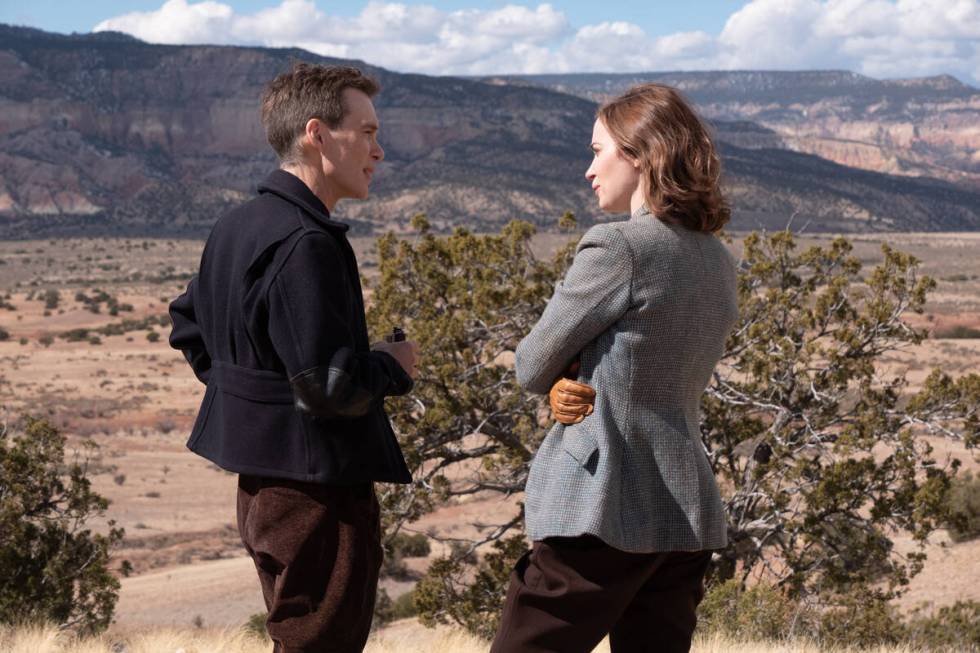What Oppenheimer’s granddaughter wants you to know about the famed scientist

Dorothy Oppenheimer Vanderford never could’ve imagined that her grandfather would be one of the absolute heroes of the summer, more popular with moviegoers than Dominick Toretto, Ethan Hunt and even Indiana Jones.
Not bad for a theoretical physicist.
“You know, I didn’t know that so many people were even aware of (J. Robert) Oppenheimer or the history of the building of the atomic bomb,” says Vanderford, who works at the Nevada National Security Site and has called Boulder City home since 1998. “It’s really exciting to see how much public interest there is in watching this movie.”
“Oppenheimer,” a three-hour biopic, portions of which were filmed in black and white, is the sort of prestige picture more accustomed to opening in the final weeks of the year for awards consideration. Instead, it shocked the industry last weekend with an $82 million-plus domestic opening, earning more money in its first weekend than any Christopher Nolan-directed movie not named “The Dark Knight” or “The Dark Knight Rises.”
It’s earned an estimated $174.1 million domestically through Sunday, with few signs of slowing down anytime soon. Globally, it has topped $400 million in sales.
‘Almost surreal’
Vanderford, one of three children of Oppenheimer’s son, Peter, was born in 1973, more than six years after the death of the man known as “the father of the atomic bomb.” But that hasn’t stopped her from becoming one of his leading proponents. Along with her brother, Charles, she’s been caught up in a whirlwind of interviews tied to the movie’s release that culminated in Thursday’s sold-out discussion hosted by the Atomic Museum.
“This has been almost surreal,” Vanderford says. “I spent my life being under the radar, so to be out in the public talking is unusual and a bit of a challenge for me.”
The advocacy for the man she never knew began in earnest when she started working with Charles’ Oppenheimer Project. The organization is designed to promote their grandfather’s legacy and the advancement of nuclear energy, including his desire to cooperate with other nations, something that landed him in hot water during the Red Scare of the 1950s.
“I’m not really in a position to give juicy tidbits that no one ever knew before,” Vanderford says in her unofficial role as an Oppenheimer spokeswoman. “But his legacy is so significant that I can certainly talk about how important the work he did was and how important it still is today.”
The family tends to take a hands-off approach to projects about the famed scientist. They weren’t involved in the production of “Oppenheimer” and had little to do with its source material: “American Prometheus: The Triumph and Tragedy of J. Robert Oppenheimer,” the 2006 Pulitzer Prize winner by Kai Bird and Martin J. Sherwin.
“Oppenheimer” follows the biography pretty closely, so there were no big revelations, Vanderford says. She was able to appreciate it as a movie and not be distracted by the family connections.
“Partly because I didn’t know him. I think that probably helps,” she says. “In some ways, he’s a character. People see him as sort of mythological. So I can separate the real person from what’s being shown on the screen.”
‘He was complex’
She liked the movie, overall, but a couple of things stood out. Primarily the sequence in which Oppenheimer, portrayed by Cillian Murphy, injects cyanide into an apple left on the desk of his Cambridge University tutor, before coming to his senses and throwing it away.
“He didn’t try to kill his tutor. There’s no proof that that actually happened,” Vanderford insists. “So it’s unfortunate that that’s going to be presented as a factual thing.”
Then there was the amount of time the movie spent on Oppenheimer’s extramarital relations.
“I’m not sure that all the information about (his) affairs was accurate,” she adds, “but I think it’s perfectly fine to portray a complex person on the screen. He was complex. That’s fair.”
If anything, the movie has brought her family closer. Her father didn’t talk about Oppenheimer much when she was growing up, but that’s changed. “It’s been a form of family bonding, really, talking with my parents, both my mom and my dad, and my siblings,” she says. “We talked a lot more lately.”
As for what she wants audiences to know about her grandfather, Vanderford says, “I like to think of him as a hero, because he did his duty and his service to his country. He led this enormous scientific project, not just because he was brilliant, but because he could get all these different people together to get a job done in a short amount of time to serve a bigger purpose.”
“He was treated poorly,” she says of Oppenheimer’s later years, including the 1954 hearing over whether to revoke his security clearance that forms one of the main arcs of the movie. “But he still kept talking about the values that were important to him, about open communication and sharing of information. So I tend to see him as heroic, because of his ability to persevere and speak his mind, even in the face of severe resistance.”
Contact Christopher Lawrence at clawrence@reviewjournal.com or 702-380-4567. Follow @life_onthecouch on Twitter.